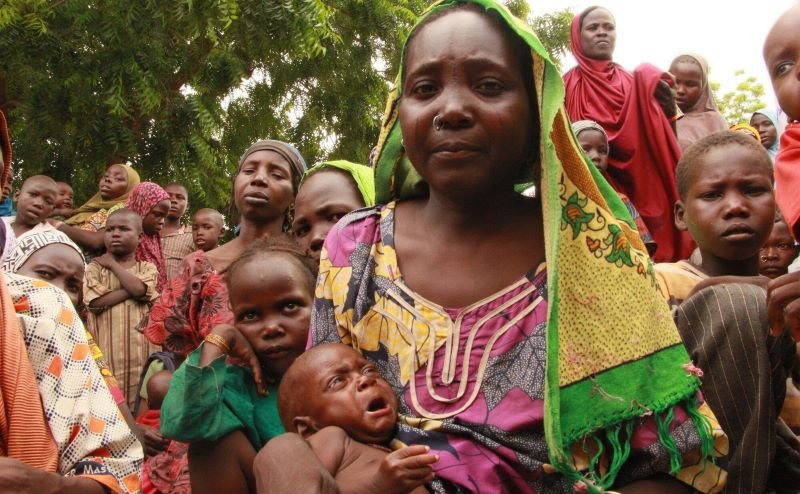FOUR months after the government evacuated more than 22,000 people and dismantled its water supply, Muna displaced persons camp on the outskirts of Maiduguri is now a shadow of its former self, a silent, skeletal relic of war on Boko Haram.
But Maryam Suleiman, a 50-year-old widow, has refused to leave.
Suleiman and her 12 children continue to sleep beneath rusting, leaking roofs as the walls of the camp slowly crumble around them.
“They gave us options to stay or return home,” she says, standing in what remains of the camp that has sheltered her family for a decade. “But they’re still killing people there.”
Her hometown of Dongo, in Mafa Local Government Area about 49km (30 miles) from Maiduguri is where Boko Haram fighters murdered her two younger brothers in 2014. It is also where the government now insists she must return, declaring the area “safe.”
Yet safety, Suleiman insists, is an illusion.
Borno State Governor, Babagana Umara Zulum ordered the closure of all IDP camps in 2023, citing improved security and a need to “restore dignity” to displaced populations.
But by May 2025, months after resettlement began, Boko Haram fighters launched fresh attacks in Marte, killing five soldiers at a military base. Similar raids followed in Dikwa, Rann, and Gajiram.
According to report, more than 90 people have been killed in the past five months across Borno State, with the Marte attack alone forcing 20,000 newly resettled residents to flee once again.
“I remember those days when our community was rich in agricultural produce,” Suleiman recalls wistfully. “People from Maiduguri travelled to our community to trade. I never needed to visit the city. I had everything I wanted in my village.”
Now, in the skeleton of Muna camp, Suleiman shares a single room with 15 relatives. Her children, once in school, no longer attend classes.
“We hardly eat unless we go out to look for food,” she says. “The government and NGOs removed everything when they closed the camp.”
At the entrance of the camp, Donoma Gamtayi, an elderly farmer from Marte, watches military trucks rumble past toward his embattled hometown.
“Boko Haram still operates,” he says grimly. “When they kidnap, they demand ransom, sometimes up to two million naira.”
“If security forces are deployed permanently in our communities, we will have the confidence to return,” he adds.
Security analyst, Kabir Adamu notes that while government resettlement policies are aimed at normalising life, the reality remains grim.
“Outside major garrison towns, villagers are still extremely vulnerable,” he warns. “Some are forced to pay ransom to Boko Haram or ISWAP fighters acts that technically support terrorism in the eyes of the state, exposing them to arrest.”
This cycle of fear, extortion, and punishment leaves many IDPs stuck between two threats: armed insurgents and the law.
Governor Zulum has repeatedly defended the closures, saying the camps had become breeding grounds for “prostitution, gangsterism, and child abuse.”
“Living in IDP camps is not what we are used to or what we like as a people,” Zulum stated. “We believe a safe life of dignity is a right for all citizens of Borno. Boko Haram can never be eradicated without resettlement. People have to go back to their homes and earn their livelihood.”
But aid agencies paint a starkly different picture.
The United Nations Children’s Fund (UNICEF) warns that 4.5 million people in northeastern Nigeria need humanitarian assistance, half of them children.
“Families are skipping meals, children are wasting away, and mothers are arriving at feeding centres with babies hanging between life and death,” says Wafaa Elfadil Saeed Abdullateef, UNICEF’s representative in Nigeria.
From January to June, UNICEF and partners provided health services to 1.3 million people, treated 340,000 children for severe malnutrition, and supported over 500,000 children back into classrooms. Yet Abdelatef admits “needs are rising faster than the response.”
Psychological wounds run deep. Years of displacement have left many IDPs suffering from untreated trauma. Without adequate psychosocial support, experts warn, resettlement only deepens emotional scars and fuels conflict with host communities over scarce resources like land and water.
For residents like Garba Uda’a, life in Muna has reverted to the uncertainty of their earliest days in the camp.
“Yes, we are afraid, but they should support us no matter how little,” he pleads. “The farming season has passed. The economic situation is making survival even harder.”
Suleiman, however, has made her choice: she will not return to Dongo.
If the government can relocate her somewhere safe, she dreams of starting a small provisions shop to support her family.
But not in the village where her brothers were murdered.
As the sun sets over the ghostly camp, Suleiman sweeps the floor where her children will sleep. The roof leaks, the toilets are broken, and hunger bites at their stomachs.
But they are alive.
“Until news of bloodshed sounds strange in our ears,” she says softly, “we will stay.”







